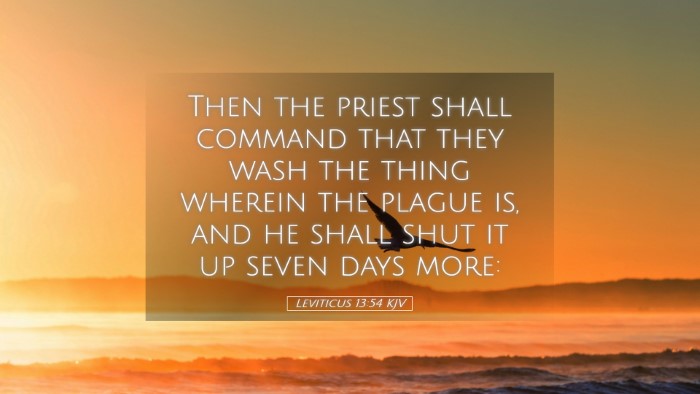Commentary on Leviticus 13:54
Verse Context: Leviticus 13:54 states, "Then the priest shall look at the sore after the seventh day; and if the sore has not changed its appearance, and the sore has not spread on the skin, then the priest shall pronounce him clean; it is only an eruption. But the man is clean." This verse is part of the law concerning leprosy and skin diseases, which were significant concerns in ancient Israel and governed by strict protocols.
Insights from Matthew Henry
Matthew Henry emphasizes the importance of the priest's role in the community, acting as a mediator not only in spiritual affairs but also in matters of health. He notes that the priest examines the sore thoroughly, underscoring the weight of discernment in declaring someone clean or unclean. This process reveals the seriousness with which the Israelites approached cleanliness, both physically and spiritually.
Henry also highlights the notion of waiting on God—indicated by the set period of seven days. He reflects on the symbolism of the number seven, often associated with completeness in Scripture. The waiting period allows for careful observation and demonstrates a form of patience and faith in God’s sovereignty over health matters.
Reflections from Albert Barnes
Albert Barnes provides a detailed examination of the customs associated with leprosy. He discusses how the condition was seen as not just a physical ailment, but also a spiritual one. Barnes remarks that societal implications also stemmed from such diseases, often leading to isolation of the afflicted. The clear distinction of what constitutes 'clean' or 'unclean' marks the boundary between community and exclusion.
Furthermore, Barnes underscores that the priest's declaration of cleanliness is not just an affirmation of physical health—it's deeply interwoven with the individual’s standing in the community of Israel and before God. He points out that this process is protective for the community, ensuring that spiritual and health standards are maintained in the camp of Israel.
Considerations from Adam Clarke
Adam Clarke's commentary delves into the specific conditions under which a person would be declared clean. He notes that the criteria are stringent, which reflects God's desire for purity among His people. Clarke interprets the 'eruption' mentioned here as a teaching moment about the greater implications of sin and its visible manifestations within a community.
Clarke also alludes to the psychological and emotional aspects of disease in Scripture. The careful evaluation by the priest can symbolize a broader principle of vigilance and discernment that spiritual leaders must exercise in their care for individual souls. There’s a parallel drawn between physical ailments and spiritual conditions; both require discernment and sometimes a process of restoration before full acceptance back into the community.
Theological Implications
The theological significance of Leviticus 13:54 extends beyond its immediate context. It teaches about:
- The nature of sin: Just as physical ailments need assessment and time, so does spiritual decay require reflection and repentance.
- God’s holiness: The meticulous nature of the law highlights the seriousness of God's holiness and the need for purification.
- Community standards: Cleanliness is a communal concern reflecting on how individual behaviors can affect the whole.
- Restoration: The concept of being declared clean emphasizes God's redemptive process and the hope of restoration for believers.
Conclusion
Leviticus 13:54 serves as a vital reminder of the call for sanctification and discernment within the community of faith. The insights from Matthew Henry, Albert Barnes, and Adam Clarke provide a layered understanding of this passage, enhancing our appreciation for the laws given to Israel as a means of grace and separation unto God. Ministers and students of the Word are encouraged to view these laws not only as relics of the past but as enduring lessons on holiness, community, and the need for vigilance in both physical and spiritual realms.


